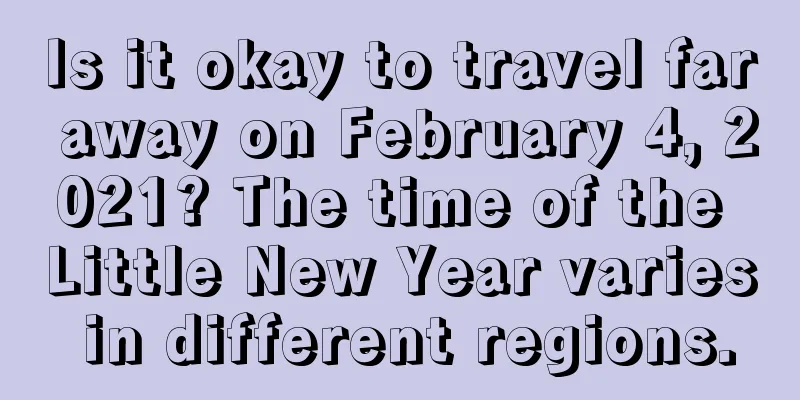Is it okay to travel far away on February 4, 2021? The time of the Little New Year varies in different regions.

Introduction: It is generally necessary to choose an auspicious day for traveling far away, so [Is it a good day to travel far away on February 4, 2021? The time of the Little New Year varies in different regions] Follow the editor to find out. “La means connection, the handover between the new and the old, so grand sacrifices are held to reward merits.” The twelfth lunar month is also a month for sacrifices. So what is the fortune and inauspiciousness of the twelfth lunar month in 2020? Let’s learn more about it with Mr. Shui Mo.Is it okay to travel far away on February 4, 2021?Lunar calendar: December 23, 2020 Gregorian calendar: February 4, 2021, Thursday, Aquarius - Today's suitable days (do not use it for major events on the day of the broken moon) - repair graves, fast and offer sacrifices, receive money, take office, seek offspring, plant, get rid of, seek medical treatment, break up the house, build a stove, take medicine, travel by boat, recruit a son-in-law, and sign a contract - Today's taboos (do not use it for major events on the day of the broken moon) - open the market, travel, seek money, build, offer sacrifices, pray for blessings, bury, move the coffin, break ground, start drilling, bury, receive betrothal gifts, marry, move into the house, install doors, separate, break ground, install beds, close tents, wear hairpins, put on beams, erect pillars, build houses, buy property, release water, receive livestock, migrateAccording to the contents of the old almanac, since this day is a day with a broken moon, it is not suitable to travel far on the Little New Year's Day of February 4, 2021. The time difference of Xiaonian in different regionsMost of the northern regions: The 23rd day of the twelfth lunar month - "Little New Year in the North"Since the middle and late Qing Dynasty, the imperial family has held a ceremony to worship the heaven on the 23rd day of the twelfth lunar month. In order to "save money", they also worship the Kitchen God. Therefore, the people in the northern regions followed suit and celebrated the Little New Year one day earlier on the 23rd day of the twelfth lunar month. Most of the southern regions: The 24th day of the twelfth lunar month - "Traditional Chinese New Year" As early as the Song Dynasty, there were records of "celebrating the Little New Year on the 24th day of the twelfth lunar month". In most parts of the south, the ancient tradition of celebrating the Little New Year on this day is still maintained. Jiangsu, Zhejiang and Shanghai regions: the day before New Year's Eve - "Little New Year's Eve" In the Jiangsu, Zhejiang and Shanghai regions, New Year's Eve is usually called "Big New Year's Eve". Correspondingly, the night before New Year's Eve is called "Little New Year's Eve", and this day is also called Little New Year. Historically, the 24th night of the twelfth lunar month, which the people of Wu called the 24th Night, is the day to send off the Kitchen God, and therefore called this night the Little New Year's Eve. Parts of Sichuan and Guizhou: New Year's Eve - "Little New Year" In some areas in southwest my country, people celebrate the Little New Year on New Year's Eve, and their Big New Year is mostly on the 14th or 15th day of the first lunar month. Nanjing and other places: The 15th day of the first lunar month (Lantern Festival) - "Little New Year" According to legend, after Emperor Chengzu Zhu Di usurped the throne, the people of Nanjing complained about his cruelty and harsh rule. They used the lantern festival on the 15th day of the first lunar month to remember the previous emperor's lenient rule, so the Lantern Festival became Nanjing's Little New Year. The origin of XiaonianAccording to folklore, the origin of Xiaonian is related to the "Kitchen God"; Xiaonian originally meant to worship the Kitchen God and pray for good health and prosperity in the coming year. With the changes of the times, Xiaonian has become a day to pray for family reunion.According to folklore, on the 23rd (or 24th) day of the twelfth lunar month, the Kitchen God goes to heaven to report the good and evil deeds of each family to the Jade Emperor, who then rewards or punishes them. Ordinary people believe that they must respect the Kitchen God, and thus, there is the “Little New Year” on the 23rd and 24th of the twelfth lunar month, when people worship the Kitchen God and pray for peace and good fortune in the coming year. Xiaonian, also known as the Kitchen God Festival, does not refer to a specific date. It is the 23rd day of the twelfth lunar month in the northern region and the 24th day of the twelfth lunar month in the southern region. The Jiangsu, Zhejiang and Shanghai regions call "the 24th day of the twelfth lunar month" and "the night before New Year's Eve" Xiaonian. The Nanjing area calls the Lantern Festival on the 15th day of the first lunar month Xiaonian. |
Recommend
How to send blessings for the Jingzhe solar term in 2019
Please take precautions. Here I will show you how ...
Is it possible to travel and seek wealth on Christmas Day in 2019, the Year of the Pig? Is it an auspicious day?
Christmas is on December 25th of the Gregorian cal...
2017 August 8th time query auspicious and inauspicious time query
August ushers in the golden autumn season. This i...
Is the second day of the Lunar New Year in 2022 an auspicious day for caesarean section? Can I give birth in the hospital?
Different days have different fortunes, so let’s t...
Brief introduction to Xiaoman solar term, what is the origin of Xiaoman
The so-called 24 solar terms can generally be unde...
What day is February 11th in the lunar calendar? One of Yang Gong’s Thirteen Taboos?
Introduction: Our country is a very typical tradit...
Is it a good fortune for a boy born on the tenth day of the first lunar month in 2019?
The day of birth determines a person's eight c...
Is it a good idea to give birth to a baby girl on November 13th of the lunar calendar in 2017? What are the auspicious and inauspicious days?
The arrival of a new life always makes the whole f...
Is it auspicious to get married on the ninth day of the fifth lunar month in 2020?
Is it auspicious to get married on the ninth day ...
Is it suitable to pray the day after the light snow on the ninth day of the tenth lunar month in the Year of the Rat 2020?
Is it suitable to pray the day after the light sno...
Is it auspicious to go up the beam on the Spring Beginning Day in 2020? Will it still be cold after the Spring Beginning in 2020?
Introduction: It is also necessary to choose an au...
What is the fate of a man born on May 1st? Is he destined to be successful in his career?
Traditional numerology believes that babies born a...
A detailed introduction to the precautions for health preservation during Grain in Ear. Is the weather starting to get hot during the Grain in Ear solar term?
Speaking of health care, I believe everyone is fam...
Is the weather still hot during the White Dew Festival? Is it not possible to visit the graves the day before the White Dew Festival in 2020?
Introduction: Different solar terms indicate weath...
What is the lunar calendar for the Grain Rain solar term in 2022? Can I get a haircut during the Grain Rain?
Guyu is the sixth solar term in the twenty-four so...









